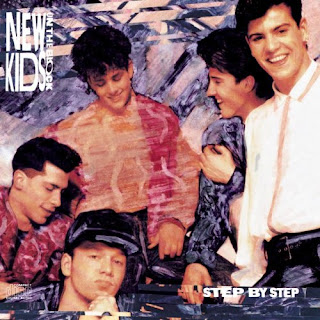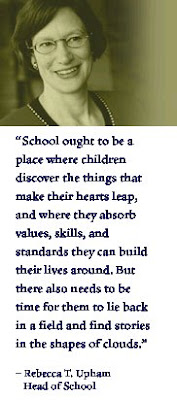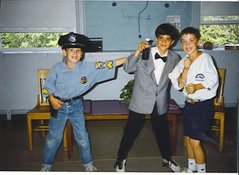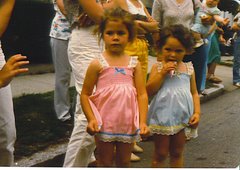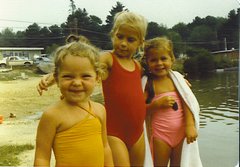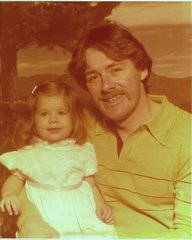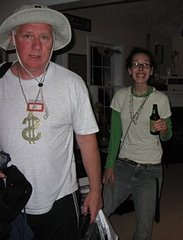 This means that everything is 50% off. Since the change of weather last weekend, I had been looking forward to sale day when I could find some gems for summer: tank tops, retro skirts, vintage dresses, clothes for dance rehearsal. Unlike the Saturday shoppers, the folks who shop during the weekday hours are not mere Weekend Warriors. There is a sense of solidarity on Wednesdays as folks investigate armpits of t-shirts, smell the fabric, test stains by scratching at them. Bargain hunters are not easy to please, even if their desired item is 99 cents.
This means that everything is 50% off. Since the change of weather last weekend, I had been looking forward to sale day when I could find some gems for summer: tank tops, retro skirts, vintage dresses, clothes for dance rehearsal. Unlike the Saturday shoppers, the folks who shop during the weekday hours are not mere Weekend Warriors. There is a sense of solidarity on Wednesdays as folks investigate armpits of t-shirts, smell the fabric, test stains by scratching at them. Bargain hunters are not easy to please, even if their desired item is 99 cents. Each week there is one color that is not 50% off and this week it was pink; coincidentally, pink was the color of most of the desirable summer clothing in the store on
The clothes at this store are arranged by color.
As I flipped through the various shades of green, I overheard a woman commenting out loud yet to herself (“oh, that’s too expensive”, “this is cute”, “West
About six years ago at the Harvard Square T Station, a crazy old, white, homeless man picked me out of a crowd. I was standing next to a pole waiting for the train and he slowly stood up from the bench where he was sitting, walked up to within my peripheral vision and starting screaming profanities at me. His spittle landed on my face. I cringed, I panicked, and ran to a family that was further down on the platform. I was totally embarrassed, as I often am when my Fight or Flight Instinct kicks in. I am a flyer, not a fighter and after my flights I tend to feel bullied by this weak survival instinct. In any case, that was my crazy in
In
That same year, I was followed from the Downtown  Berkeley BART station to the intersection near my apartment by a legitimate schizophrenic. A middle-aged, white schizophrenic man. For the ten minute walk to my neighborhood, he stayed about 15 feet behind me, mumbling “Cunt, Bitch, Fuckface” repeatedly. I decided that I could not go the extra 50 feet to my front door because he would know where I lived. So, I criss-crossed the intersection for about ten minutes as the lights went from red to green and back again. He got confused and finally I made the dash across the street right when the blinking orange hand was counting down “5, 4, 3, 2, 1” He was stuck on the other side, he got tired, and I saw him lose his concentration and walk down the street in the opposite direction.
Berkeley BART station to the intersection near my apartment by a legitimate schizophrenic. A middle-aged, white schizophrenic man. For the ten minute walk to my neighborhood, he stayed about 15 feet behind me, mumbling “Cunt, Bitch, Fuckface” repeatedly. I decided that I could not go the extra 50 feet to my front door because he would know where I lived. So, I criss-crossed the intersection for about ten minutes as the lights went from red to green and back again. He got confused and finally I made the dash across the street right when the blinking orange hand was counting down “5, 4, 3, 2, 1” He was stuck on the other side, he got tired, and I saw him lose his concentration and walk down the street in the opposite direction.
I’ve had a black teenage boy scream at me while waiting for the train about my spoiled, racist life. I never said a word. I sat there for ten minutes before I got up and left the station to go back home and abandoned my plans for an excursion to
I’ve had a middle-aged, middle-class-seeming white woman stop me on High Street when I lived in
That last one was probably the scariest. That sincere and patient I-hate-you-so-much-that-I-am-smiling-while-I-secretly-put- a-curse-on-all-your-family crazy. That one unsettled me because I had to respond to her as though she were asking me for directions. I was Russian after all.
But I digress.
At Salvation Army on Wednesday, this t-shirt commenting black woman attached herself to my ten foot radius. She began picking up all the clothes I was rejecting and commenting, “you’ve got a stain”, “this one might fit me.” And then she addressed me as she approached me from the mirror where she had been modeling a pink cardigan in the mirror.
“What do you think about this? Is it too small?”
I turned to her nonchalantly, like we had been shopping together all afternoon and said, “I like it. I don’t think it’s too small, but I think it may be too short. But it’s a good color on you.” I had experience with the stranger-telling-you-how-it-looks routine.
“Yeah, it’s a little short,” she said as she refocused her attention to the mirror. “But it’s a blue tag, so it’s only two dollars today.”
“You can’t beat that.”
And she took her hands and cupped her breasts and said, “And my breasts look nice in this, don’t you think?”
“I think it looks good on you,” avoiding answering directly the question posed to me. I went back to my t-shirts (in the yellow category now) and pulled out one with green lettering and a picture of a MACK truck that read “Tom’s Auto Truckers Inc. …In for the Long-Haul.”
“You going to get that?” She was looking at my selection.
“I’m thinking about it.”
“It’s only 99 cents.”
“You can’t beat that.” As many of my prior experiences with unsettling strangers prove, a conversation that lasts for sixty seconds or longer invites a misinterpretation. A fleeting friendship. I passed this marker.
“Are you from
I always think this is a funny question because so many people here are not from here. I also wonder what makes you a New Yorker. How long do you live in one place before you can say that you are “from there”? Will I ever live in a place long enough to say that I am from somewhere other than
“Not originally. Are you?”
“Yes. So, where are you from?”
“
“Oh, yeah. Good old segregated
Silence on my part. Clearly, no response I could give will suffice. Saying “no,
She continues, “Yep,
I felt that I could participate in some way, now that I understood she was talking about busing. After all,
Here’s where we started to go downhill. “AWHILE ago? Honey, that shit is still going on in
I could feel a rush of tears come to my eyes. This isn’t unusual. When I feel that someone is criticizing my background or part of me, I crawl into my emotional hole (flight instinct, remember?) and feel bruised. But I realized that part of the reason I felt bullied was because this was happening in the middle of a store filled with mostly non-white people. I can’t get into a conversation defending my race or the city of
“You know, my brother teaches up there  and there is RESERVED parking. Can you believe that shit? Reserved for the whites.”
and there is RESERVED parking. Can you believe that shit? Reserved for the whites.”
It was becoming easier to make the tears disappear because now I knew she didn’t have any idea what she was talking about. She was dismissable now. And I just nodded my head because I wanted to escape to the other section of the store without making it seem like I was being bullied…even though that was exactly what was happening.
“Do your parents still live up there, in segregated
“Yep.”
“Do you have brothers and sisters?”
“Yep.”
She was trying to veer off the subject of segregated
“Wow. What do you mean the oldest? How old are you? 32?”
Again, I am offended. Most people think I look at least five years younger than I am and here she was guessing that I am two years older than I actually am.
“30.”
“Oh, you’re a baby. It’s very brave of you to live in
“Yep,” and I began to drift down another aisle, gently slipping away from the ten foot radius with this woman with the pink cardigan breasts.
She continued on with her train of thought, though, “You know all the schools up there and their RESERVED parking. But
I wondered to myself if all people have these one-on-one conversations during their lifetime, “Is it just me? Is it because I look normal, approachable, average, a spokesperson for your typical white American female?” I looked across the rack of black blouses at the black, male employee stocking the dresses and he glanced at me, not really in solidarity, not really in contempt, but just kind of like “That’s life. She’s crazy. You’re white. You shop at Salvation Army for your hipster clothes. What do you expect?” And I think he may be right.
When I checked out at the register, there was a black woman standing behind me who told me that I “chose some really nice stuff” and that I had “very good taste.” I thanked her and felt slightly redeemed, not because a black lady said nice things to me, but because I had re-established my solidarity with the shoppers at Salvation Army. I was proud of my purchases, my bargains, my t-shirts that once had been segregated by their color and were now laying in a heap together on the counter.



